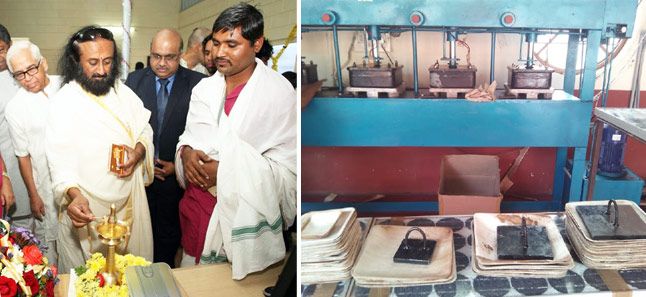Bangalore, Karnatka: Radheshyam Kakodia came to the ashram from Chhattisgarh to train villagers. He has trained more than 300 people to make eco-friendly plates using areca nut leaves and also in making smokeless chulhas.
Radheshyam had this urge to serve society though his family and wanted him to join civil services. Even when he was a student attending coaching classes for the Civil Services exam, he wanted to do something to uplift poor people living in rural areas. The Art of Living gave him an opportunity to do so by starting a project called “Rural Development and Awareness Program.”
Most of his family members and relatives are into civil services, and his uncle wanted him also to opt for it. In 2012, he completed his MBA and took up work in the HR field for about two years. After that he was motivated to take up civil services.
Since he lost his father at an early age of eight, his cousin Sanjeev Panwar, an Art of Living faculty, inspired him to join the program. Later on, Gurudev Sri Sri Ravi Shankar influenced him to a great extent and he shifted to Bangalore ashram. These programs touched him deeply and his personality underwent several transformations. Finally, he could fulfil his dream of serving the rural poor. He came up with the idea of smokeless chulha (stove) for rural women, and his new design has helped women overcome health issues. The stoves were distributed in the villages of Maharashtra, Chhattisgarh, and Madhya Pradesh.
Radheshyam’s cousin, Panwar, an Art of Living teacher, started making eco-friendly plates with the help of areca nut. These plates are biodegradable, compostable and environment friendly. This also created employment for the women in the villages. Radheyshyam and his team trained women in making plates and once they were confident, they continued working from their homes and earned sufficient money.
Radheshyam said there are plans to manufacture these plates on a large scale, especially in villages that have several areca nut trees. Kerala, Karnataka, Tamil Nadu and Assam are abundantly populated with these trees, and procuring raw material would be easy.
